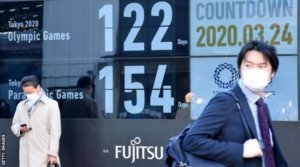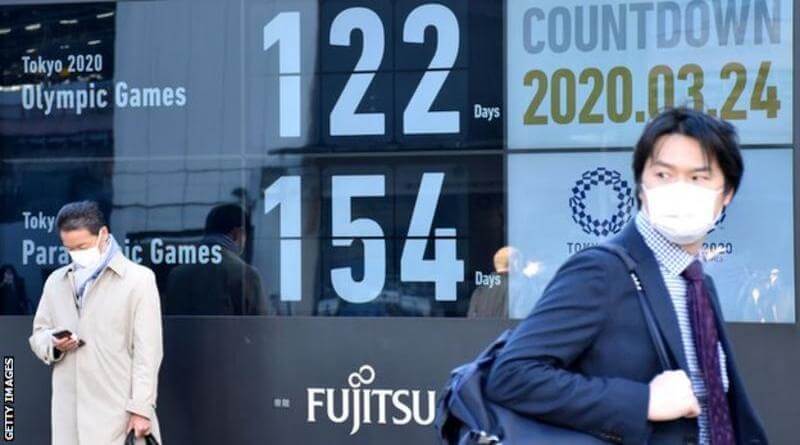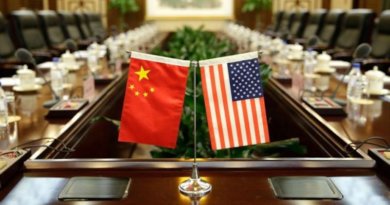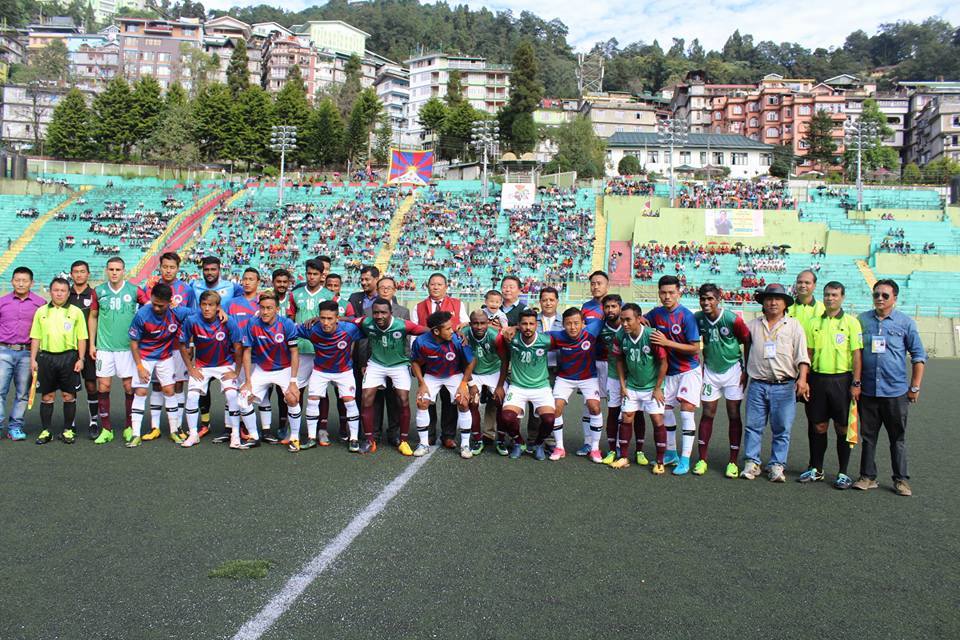Tokyo 2020: Olympic and Paralympic Games postponed because of coronavirus
BBC | 24 March 2020.

The Tokyo 2020 Olympic and Paralympic Games have been postponed until next year because of the worldwide coronavirus pandemic.
The event, due to begin on 24 July, will now take place “no later than summer 2021”.
“I proposed to postpone for a year and [IOC] president Thomas Bach responded with 100% agreement,” said Shinzo Abe, Japan’s Prime Minister.
The event will still be called Tokyo 2020 despite taking place in 2021.
In a joint statement, the organisers of Tokyo 2020 and the IOC said: “The unprecedented and unpredictable spread of the outbreak has seen the situation in the rest of the world deteriorating.
“On Monday, the director general of the World Health Organization, Tedros Adhanom Ghebreyesus, said that the Covid-19 pandemic is ‘accelerating’.
“There are more than 375,000 cases now recorded worldwide and in nearly every country, and their number is growing by the hour.
“In the present circumstances and based on the information provided by the WHO today [Tuesday], the IOC president and the prime minister of Japan have concluded that the Games of the XXXII Olympiad in Tokyo must be rescheduled to a date beyond 2020 but not later than summer 2021, to safeguard the health of the athletes, everybody involved in the Olympic Games and the international community.”
While the Games is the biggest sporting event to be affected by the pandemic, there has been a huge impact on a host of other major tournaments and sports:
- In rugby union, the end of this year’s Six Nations was postponed, with four outstanding fixtures to be rearranged in the men’s tournament.
- In football, Euro 2020 was postponed and will be played in the summer of 2021, while the sport is suspended in the UK until 30 April at the earliest.
- The first eight grands prix of the Formula 1 season have been delayed, with the Monaco Grand Prix cancelled.
- County cricket in England and Wales will not be played before 28 May, while England’s three-Test series against West Indies, due to start at The Oval on 4 June, is in doubt.
- All forms of professional tennis have been postponed until 7 June, ruling out the clay-court season, while the French Open – the year’s second Grand Slam, has been rescheduled for September.
- Golf’s Masters and PGA Championship have both been postponed, with a decision yet to be made about September’s Ryder Cup.
- The London Marathon has been moved from 26 April to 4 October.
The IOC had given itself a deadline of four weeks to consider delaying the Games but there had been mounting pressure from a host of Olympic committees and athletes demanding a quicker decision.
Canada became the first major country to withdraw from both events on Sunday, while USA Track and Field, athletics’ US governing body, had also called for a postponement.
The Paralympics were due to start on 25 August but International Paralympic Committee president Andrew Parsons said the postponement was “the only logical option”.
He added: “The health and wellbeing of human life must always be our number-one priority and staging a sporting event of any kind during this pandemic is simply not possible.
“Sport is not the most important thing right now, preserving human life is. It is essential, therefore, that all steps are taken to try to limit the spread of this disease.
“By taking this decision now, everyone involved in the Paralympic movement, including all Para-athletes, can fully focus on their own health and wellbeing and staying safe during this unprecedented and difficult time.”
World Athletics president Lord Coe said: “The athletes have been under intolerable conditions, many of them are unable to train and many have been going through real emotional turmoil.
“The integrity of competition would have been seriously compromised if we had tried to force the Games into the remaining part of this year.”
Coe, who was chairman of the London 2012 organising committee, said World Athletics was looking at moving the 2021 World Championships in Eugene, Oregon, to 2022.
The Olympics have never been delayed in their 124-year modern history, though they were cancelled altogether in 1916, 1940 and 1944 during World War One and World War Two.
Major Cold War boycotts disrupted the Moscow and Los Angeles summer Games in 1980 and 1984.
The Tokyo 2020-IOC statement continued: “The leaders agreed that the Olympic Games in Tokyo could stand as a beacon of hope to the world during these troubled times and that the Olympic flame could become the light at the end of the tunnel in which the world finds itself at present.
“Therefore, it was agreed that the Olympic flame will stay in Japan. It was also agreed that the Games will keep the name Olympic and Paralympic Games Tokyo 2020.”
British Olympic Association chief executive Andy Anson said: “It would have been unthinkable for us to continue to prepare for an Olympic Games at a time the nation and the world no less is enduring great hardship. A postponement is the right decision.”
British Paralympics Association chief executive Mike Sharrock said: “Stemming this global public health crisis and doing everything possible to safeguard the health and wellbeing of people should clearly take priority in these unprecedented times.
“We welcome the clarity this now gives Paralympic athletes throughout the world who have had their training and qualification plans severely disrupted.”
On 22 January, Olympic qualifying events in boxing and women’s football that were due to be held in Wuhan, China – the centre of the coronavirus outbreak – became the first to be moved or postponed.
There have now been almost 400,000 recorded cases of the virus worldwide, with the number of deaths approaching 17,000.
‘The Olympics has never had a challenge like this’ – analysis
Dan Roan, BBC sports editor
This is arguably the biggest decision sport has seen in peacetime.
It has looked inevitable for weeks, and many will ask why it has taken until now.
With athletes unable to train safely, and the calendar of Olympic and Paralympic qualification events decimated amid travel restrictions and lockdowns, a postponement or cancellation emerged as the only viable options.
Faced with the unenviable task of reorganising a sprawling mega-event that has already cost at least £10bn in preparations, the IOC and Japan had hoped to buy themselves some time to consider their next step.
But with Olympic committees and athletes increasingly frustrated and confused at what some saw as delaying tactics, the decision was effectively taken out of the organisers’ hands, and just 48 hours after the IOC said it was giving itself four weeks to mull it over, we now know the Games cannot go on as planned.
The ramifications will be significant. It’s a huge blow to Japan, and the country will now have to spend yet more money. Commercial contracts will have to be unpicked and the availability of venues revisited. A crowded sporting calendar will have to be flexible. And the IOC, sports federations, broadcasters, sponsors and a myriad of other related businesses will have to wait an additional year for the financial bonanza that the event generates.
The Games has had to deal with many challenges over the years, from terrorism and boycotts to war and doping. But nothing quite like this.
How athletes reacted
Olympians
Alistair Brownlee, double Olympic triathlon champion: “Evidently a very tough decision for the IOC and other stakeholders to make but in my opinion the right one. Both, for the message it sends to people around the world battling with the virus and to give clarity to athletes attempting to prepare.”
Jazmin Sawyers, long jumper: “The right choice. For now we have to stay home to protect ourselves and everyone else. Look after each other, sport will be here when this is over, and we will be ready to give you all the greatest show on earth.”
Callum Skinner, retired cycling team sprint Olympic champion, who fronts competitor-led movement Global Athlete: “The right decision has been made. Tokyo 2021 presents an amazing opportunity to host a full Games celebrating the world (hopefully) entering the “post-pandemic” phase.”
Sophie McKinna, British shot putter: “The right call in unprecedented circumstances. Welcome to #Tokyo2021
Paralympians
Ali Jawad, silver medal-winning powerlifter: “The right call in unprecedented circumstances. Welcome to #Tokyo2021”
Kadeena Cox, cycling and athletics champion: “The right choice. Health before everything. Let’s all stick together through these tough times and when the time is right we can enjoy the Games and its legacy.”
Cyclist Lora Fachie: “On a personal level I am devastated. Tokyo 2020 has been my target for the past four years. I’ve lived, slept and breathed it, giving me focus and drive. But it is also without doubt the right decision to have made. Back to the drawing board we go.”
Dan Greaves, discus thrower: “Absolutely the right decision to postpone both the Olympics & Paralympics by a year. Health comes first.






